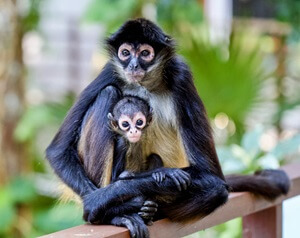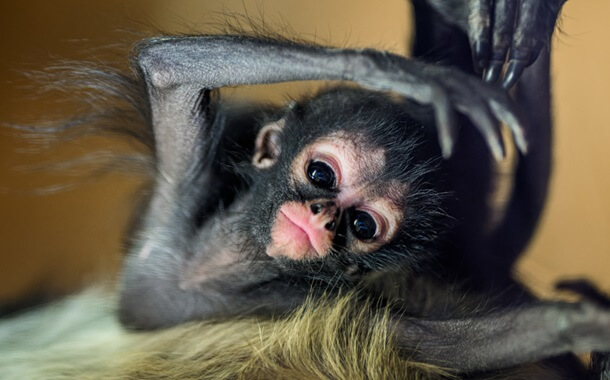How Much Does a Spider Monkey Cost?
Last Updated on April 9, 2024
Written by CPA Alec Pow | Content Reviewed by ![]() CFA Alexander Popinker
CFA Alexander Popinker
With their expressive faces, acrobatic brachiation, and inquisitive nature, it’s easy to understand the appeal of spider monkeys as exotic pets. However, the complex dietary, housing, veterinary, and enrichment needs involved, coupled with stringent legal restrictions, make spider monkey ownership an immense undertaking in terms of cost and commitment.
This comprehensive guide examines average spider monkey pricing, housing expenses, ongoing care costs, behavioral and enrichment considerations, ethical issues, and alternatives to ownership. We’ll provide an in-depth look at the financial realities prospective owners need to carefully evaluate before pursuing spider monkey adoption or purchase.
Expect to spend around $8,000 to $12,000 or more on initial spider monkey acquisition costs. Thousands more will be required annually for a suitable habitat, specialized diet, veterinary care, enrichment supplies, and insurance. Additionally, most states prohibit private ownership, so permitting and import expenses may apply. Ensuring you can fully provide for this long-lived, intelligent primate is key before taking on such responsibility.
How Much Does a Spider Monkey Cost?
If properly permitted and licensed, initial spider monkey acquisition costs normally range from:
- $6,000 to $12,000 when sourced from reputable, regulated breeders or brokers.
- $0 to $1,000 adoption fee for a retired laboratory monkey or special needs rescue from accredited sanctuaries. Such adoption opportunities are extremely limited.
Age, pedigree, temperament, prior training, and health status can impact price considerably. Import fees also apply when sourced from international breeders.
Slate, for example, reports that spider monkeys typically cost around $6,000 from private breeders2.
Exotic Animals for Sale lists a spider monkey for sale at $12,000 and a pair of Black handed Spider Monkeys for $15,000.
Laws for Spider Monkey Ownership
Due to public health and safety risks, the vast majority of states prohibit keeping spider monkeys as personal pets. Some states allow ownership but first require extensive permitting, inspections, restrictions, and annual renewal fees of around $250. Specific municipal laws may further regulate ownership.
Where legal, expect an intensive 6 to 12 month permitting application process including home inspections and exemption requests. You must demonstrate the specialized knowledge and facilities needed to properly care for a spider monkey long-term. Even if legal in your area, spider monkey ownership involves substantial red tape and delays.
Habitat and Housing Costs for Spider Monkeys
Given their arboreal nature and demanding environmental needs, properly housing a spider monkey carries steep costs:
- Outdoor habitat – At least $4,000 for materials and construction of a minimum 200 sq. ft. escape-proof enclosure, with added expenses for enriching elements like ropes, climbing platforms, and visual barriers. Zoning laws may further restrict outdoor enclosures.
- Indoor habitat – Estimate $2,000 to $5,000 for a large cage plus accessories, toys, swings, ropes, and other enrichment objects. High ceilings are required to enable climbing and brachiation indoors.
- Maintenance – At least $100 monthly for utilities, bedding, cleaning supplies, heating, lighting, enclosure repairs, waste removal, and landscaping upkeep.
Ideally, an outdoor area should connect through a tunnel to the indoor habitat for refuge during harsh weather. The combined setup is essential given spider monkeys’ advanced climbing skills and stimulation needs.
You might also like our articles on the cost of a capuchin monkey, a finger monkey, or a marmoset monkey.
Monthly Spider Monkey Care Costs
Regular ongoing care expenses include:
- Specialty diet – $80 to $150 for fruits, vegetables, primate pellets, greens, and other food items. Variety and organic produce is ideal.
- Enrichment supplies – $50 to $150 for new toys, swings, puzzles, nesting materials and other mental stimulants to prevent boredom and stress. Enrichment is a crucial expense.
- Grooming tools – $20 to $30 monthly for brushes, nail clippers, toothbrush and other grooming supplies to maintain health and bonding.
- Veterinary care – $200 to $800 for annual exams, standard treatments and medical procedures. Budget extra for unforeseen emergency needs.
- Insurance – $100 to $200 monthly for comprehensive exotic pet health insurance, strongly recommended given high potential veterinary costs.
Spider Monkey Social Requirements
Key considerations surrounding their advanced psychological needs include:
- Spider monkeys are highly social. It is recommended to acquire pairs or small groups to provide companionship and fulfill their bonding instincts. This exponentially multiplies all routine care and housing expenses.
- Ongoing behavioral enrichment programs are essential as well. These programs provide mental stimulation through puzzles, toys, grooming, and human interaction. Budget $800 to $1,200 annually for a professional trainer experienced with primates.
Their innate energetic, inquisitive nature demands substantial expertise and financial commitment to care for them responsibly over a 30+ year lifespan.
The Ethical Debate Around Ownership
The practice of keeping spider monkeys as exotic pets has faced growing ethical condemnation in recent years due to concerns over:
- Inherent stress of removing them from their natural forest environment and social groups.
- Difficulty meeting their innate need for vertical space, brachiation, and constant enrichment in traditional captive settings.
- Social isolation and associated behavioral disorders without companions of their own kind.
- Risk of inadvertent neglect, abuse or abandonment by underprepared owners.
- Promoting illegal wildlife collection and trafficking if sourcing without extreme diligence.
Their high level of intelligence and sensitivity raises questions over whether any captive context can truly meet a spider monkey’s welfare needs and natural instincts.
Alternatives to Purchasing a Spider Monkey
 Rather than personal ownership, supporting accredited sanctuaries and conservation groups helps protect primates ethically. Some alternatives include:
Rather than personal ownership, supporting accredited sanctuaries and conservation groups helps protect primates ethically. Some alternatives include:
- Donating to reputable wildlife protection non-profits like WWF that work to preserve natural spider monkey habitats.
- Visiting AZA-accredited zoos to observe spider monkeys living in enriched social groups.
- Sponsoring the care of a spider monkey at sanctuaries like Primarily Primates through their adoption programs.
- Volunteering with organizations focused on spider monkey rehabilitation and release.
- Lobbying public officials to pass legislation prohibiting the private ownership of primates.
These paths allow appreciating spider monkeys in safe settings optimized for their enrichment without the harms and costs of individual ownership.
Final Words
The expenses, permitting hurdles, facility needs, and long-term commitment required to properly care for a pet spider monkey are simply unrealistic for most owners. Combined with alarming ethical concerns, personal spider monkey ownership necessitates intense reflection and preparedness from any prospective caretaker.
For many, appreciating their charm and intelligence from a distance better serves both human and primate. Please consider all options fully before embarking on such a monumental responsibility.
Frequently Asked Questions
Can you have a spider monkey as a pet?
It is generally illegal to keep spider monkeys as personal pets in the United States and many other countries. Most states prohibit private ownership due to public safety risks and the inability to meet spider monkeys’ complex care needs.
Some states may allow ownership with strict permitting. Municipal laws may further restrict ownership. Extreme caution is warranted if considering spider monkeys due to steep challenges in meeting their demanding care requirements. Their threatened conservation status also raises significant ethical concerns over private ownership.
How long do spider monkeys live?
In the wild, spider monkeys typically live 20 to 30 years. When well-cared for in captivity or sanctuaries, spider monkey lifespans average 30 to 40 years and may reach into the mid-40s. This exceptionally long primate lifespan means owning a spider monkey represents an intensive, decades-long commitment.
Life stages from infant to elderly senior require evolving care and financial resources over their long lives. The inability of most owners to meet spider monkeys’ needs over such a long life is a top reason for prohibiting their ownership as pets. Be certain you can provide adequate lifetime care before taking on the responsibility of any exotic primate.
Can a spider monkey hurt a human?
Spider monkeys can potentially inflict harm on humans due to their strong grip, agility, and teeth. Male spider monkeys in particular can become quite aggressive, especially when reaching sexual maturity.
They may bite, scratch, pull hair, and throw objects when distressed. Primate experts strongly advise against direct physical interaction due to safety concerns. If legal to own a spider monkey in your region, keep interactions behind protective barriers.
Never approach directly. Even seemingly tame spider monkeys can be unpredictable and dangerous if mishandled or startled. Exercise extreme caution and separate living quarters from a pet spider monkey.


Leave a Reply
Want to join the discussion?Feel free to contribute!